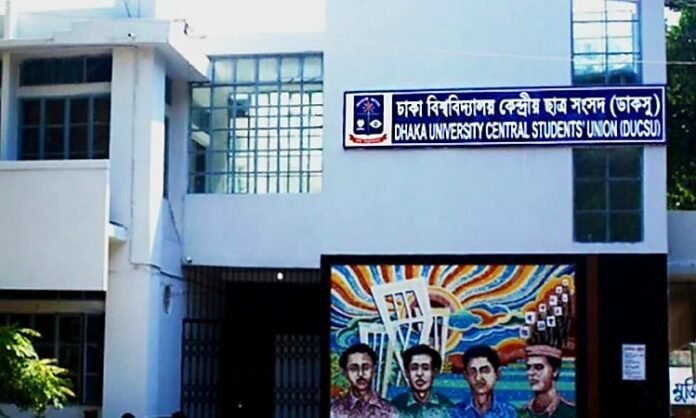After a six-year gap, the Dhaka University Central Students’ Union (DUCSU) and hall union elections are set to return on 9 September 2025. While the announcement has reignited interest across student circles, the elections come amid a turbulent political backdrop following the controversial fall of the elected Awami League government last year.
The release of the draft voter list on Wednesday marked a key step in the electoral process, with 39,932 students listed as eligible voters. Of these, 20,904 are male (52.35%) and 19,028 are female (47.65%). Students can submit objections to the list until 8 August, and the final list will be published on 11 August.
Among the male halls, Jagannath Hall leads with 2,254 voters, followed by Dr Muhammad Shahidullah Hall (2,017) and Bijoy Ekattor Hall (2,013). Among the female halls, Ruqayyah Hall has the highest number of voters at 5,676, followed by Kabi Sufia Kamal Hall (4,495) and Shamsun Nahar Hall (4,098).
Nomination papers will be distributed between 12 and 18 August, and must be submitted by 3 PM on 19 August. Scrutiny of nominations will take place on 20 August, with the preliminary list of candidates set for release on 21 August. The final list will be published on 25 August, following the withdrawal deadline on 24 August.
Voting will take place across six designated centers based on hall groupings:
Curzon Hall Center: Dr Muhammad Shahidullah, Amar Ekushey, Fazlul Haq Muslim Halls
Physical Education Center: Jagannath, Zahurul Haque, Salimullah Muslim Halls
TSC: Ruqayyah, Shamsun Nahar, Kabi Sufia Kamal Halls
Dhaka University Club: Bangladesh-Kuwait Maitree, Sheikh Fazilatunnesa Mujib Halls
Senate Bhaban: Sir AF Rahman, Haji Muhammad Mohsin, Bijoy Ekattor Halls
Udayan School & College Center: Surja Sen, Muktijoddha Ziaur Rahman, Sheikh Mujibur Rahman, Kabi Jasimuddin Halls

While the electoral procedures are now underway, questions continue to arise over the legitimacy and neutrality of the current process. The elections are being held under the supervision of an unelected interim government led by Nobel Peace Prize winner Dr Muhammad Yunus. His administration, installed in the wake of last year’s political transition, has drawn criticism for its lack of democratic mandate and failure to deliver on promises of stability, accountability, and inclusive governance.
In stark contrast to the 2019 DUCSU elections—held under the elected Awami League government and dominated by the Chhatra League—this year’s election is unfolding under markedly different circumstances. In 2019, Chhatra League candidates swept most major posts, except the vice president position, which was won by quota reform activist Nurul Haque Nur. That election reflected the Chhatra League’s deep-rooted influence and organizational strength on campus.
Since then, the student wing of the Awami League has been banned from campus activities under the current regime, raising serious concerns among students and political observers about the fairness of the upcoming election. Critics argue that the absence of a key political force undermines the democratic spirit and competitive nature of DUCSU polls.
Adding to the unease is the anticipated participation of former student activists linked to the 2024 protests—figures who are seen by some as aligned with or favored by the interim government. Many worry that this could lead to an election that lacks true representativeness.
“DUCSU has always been a breeding ground for national leadership,” said a political analyst familiar with campus dynamics. “If the electoral field is tilted or key voices are silenced, the damage goes far beyond student politics—it affects the future political balance of the country.”
With the countdown to 9 September underway, the spotlight remains on whether DUCSU 2025 will mark a genuine return to democratic student politics—or merely a managed transition under an unelected authority.


